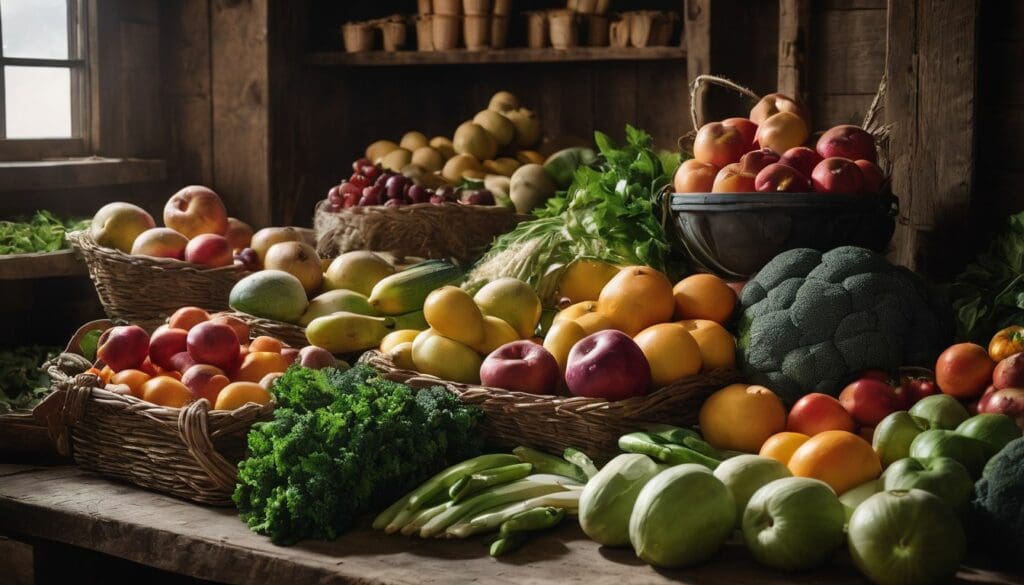Are you looking for ways to eat healthier and support your local farmers? Community-Supported Agriculture, or CSA, is a scheme where individuals pledge support to a farm’s production.
This post will explore how joining a CSA can enrich your diet, empower small-scale farming, and benefit the planet. Get ready to discover a fresher way of living!
Key Takeaways
- CSA schemes provide a stable source of income for small – scale farmers, allowing them to focus on sustainable farming practices rather than market fluctuations.
- Joining a CSA reduces carbon emissions and packaging waste by offering ultra-fresh produce that doesn’t travel far or require extensive storage, promoting environmentally friendly consumption habits.
- Members of CSAs enjoy access to fresh, seasonal fruits and vegetables which can lead to improved dietary habits and overall health while supporting local agriculture.
- Community – Supported Agriculture encourages stronger community bonds through direct interaction between consumers and producers, creating awareness about the origins of food and the effort required to produce it.
- Through CSA participation, individuals actively contribute to building resilient local food systems and become part of an eco-conscious movement that values sustainability.
What is Community-Supported Agriculture (CSA)?
Community-Supported Agriculture (CSA) stands as a partnership between farmers and consumers where individuals or families essentially subscribe to the harvest of a local farm. Members, often referred to as “shareholders,” pre-purchase a portion of the season’s produce, usually on a weekly or bi-weekly basis throughout the farming season.
This advance payment allows farmers to plan their crops with reassurance, knowing they have direct-to-consumer support and a guaranteed market for their organic produce.
In this model, both shareholders and growers share the risks and benefits of food production. CSA members get ultra-fresh produce straight from the farm while embracing seasonal eating habits that promote sustainable farming practices.
They also invest in local food systems which can lead to stronger community ties and contribute to building a fair and resilient food system within their region. Farmers benefit from upfront capital which eases cash flow worries and strengthens small-scale farming by allowing them to focus on land stewardship rather than chasing markets.
Benefits of CSA Farms for Farmers
CSA farms provide small-scale farmers with a stable revenue stream and a direct market for their produce, allowing them to receive support from their local community. This enables them to continue sustainable farming practices while providing ultra-fresh, seasonal crops to their members.
Stable revenue stream
CSA farms offer small-scale farmers a stable revenue stream. This steady income comes from the sale of memberships directly to consumers, ensuring financial security for farmers. Members pay upfront for a season’s worth of ultra-fresh produce, providing farmers with necessary funds at the beginning of the growing season.
Direct-to-consumer sales through CSA memberships eliminate middlemen and markups usually associated with traditional distribution channels. By selling directly to consumers, small farms receive fair compensation for their hard work and dedication without relying on fluctuating market prices or big retailers.
Direct market for produce
CSA farms directly market their produce to members, ensuring ultra-fresh seasonal and local crops. This direct farm-to-consumer model means that consumers have access to high-quality, nutrient-dense fruits and vegetables.
By bypassing intermediaries such as grocery stores, the produce retains its freshness longer while reducing packaging and food miles.
This approach strengthens the connection between consumers and the land it is grown on, providing an opportunity for individuals to support sustainable agriculture in their communities.
Additionally, CSA farms benefit from a stable revenue stream whilst promoting small-scale farming and locally grown food systems.
Support for small farmers
Small farmers benefit significantly from Community-Supported Agriculture (CSA) initiatives. They gain a stable revenue stream, thanks to advance payments from subscribers. This financial security allows them to invest in their crops and farming infrastructure, ultimately supporting sustainable small-scale agriculture.
By participating in CSAs, consumers directly support the livelihoods of local small farmers. The direct market for produce also enables farmers to build relationships with their customers and receive feedback on their products, contributing to a stronger sense of community within the local food system.
Furthermore, CSA farms provide an opportunity for environmentally conscious individuals to volunteer and learn about organic farming practices while supporting local food production.
Benefits of CSA Farming for the Environment
CSA farming reduces emissions and strengthens local and regional food systems. To learn more about how CSA benefits farmers, the environment, and members of the community, keep reading!
Reduced emissions
CSA farming reduces emissions by shortening the distance food travels from farm to table. This means decreased reliance on transportation, resulting in lower carbon emissions. With ultra-fresh produce at hand, there is less need for refrigeration and storage, further cutting down energy use and greenhouse gas emissions.
The direct-to-consumer model of CSA farming also minimises packaging materials often used in traditional retail settings. By opting for locally grown produce, members help reduce the demand for goods that are shipped long distances with extensive packaging requirements, contributing to a significant reduction in overall carbon footprint.
Strengthened local and regional food systems
CSA farming strengthens local and regional food systems by promoting the consumption of locally grown produce. This reduces reliance on long-distance transportation, cutting down on carbon emissions and supporting more sustainable agricultural practices.
Through CSA membership, individuals invest in their local community, fostering a stronger connection between farmers and consumers while ensuring food security within the region.
By participating in CSA programmes, individuals actively contribute to the resilience of local food systems, helping to create a more sustainable future for themselves and their communities.
Benefits for Members of CSA
Members of CSA benefit from improved dietary habits and a strengthened connection to the land and farmers, leading to a more sustainable and environmentally friendly lifestyle. Discover how you can become a part of this community-supported agriculture movement by reading more about it in our blog!
Improved dietary habits
Consumers who participate in a CSA benefit from improved dietary habits by gaining access to ultra-fresh produce, often harvested the same day they receive it. This direct farm-to-consumer model ensures that members have a consistent supply of seasonal fruits and vegetables, promoting healthier eating habits and reducing reliance on processed foods.
Engaging with local, organically grown produce encourages a more varied and nutrient-packed diet, supporting greater overall well-being.
Moreover, consuming fresh produce contributes towards environmental conservation by reducing packaging waste associated with store-bought products. This positive impact on individual health translates to larger benefits for the planet through sustainable food choices.
Strengthened connection to land and farmers
Transitioning from improved dietary habits to strengthened connection to land and farmers, community-supported agriculture (CSA) offers members a profound opportunity. Engaging with local farmers and participating in the cultivation process fosters a deeper appreciation for where food comes from.
By volunteering on farms or participating in farm-to-table events, individuals gain insight into the hard work and dedication of farmers while developing a direct bond with the land that sustains them.
This firsthand experience creates a sense of stewardship towards the environment, promoting sustainable practices and supporting small-scale farming initiatives which are vital for preserving agricultural diversity.
Conclusion
In conclusion, Community-Supported Agriculture (CSA) provides a direct farm-to-consumer model that benefits farmers, the environment, and members. Smallscale farming through CSA offers farmers a stable revenue stream and direct market for their produce.
It also reduces emissions and strengthens local food systems while improving dietary habits and fostering a stronger connection to land and farmers for consumers. Embracing the CSA approach supports conservation efforts and promotes sustainable practices within our communities.
FAQs
1. What is Community-Supported Agriculture (CSA)?
Community-Supported Agriculture, or CSA, is a direct-to-consumer model where consumers support small-scale farming by becoming farm members and receiving ultra-fresh produce regularly.
2. How does a CSA benefit the environment?
A CSA benefits the environment by promoting sustainable agriculture practices and reducing transportation emissions through its farm-to-table approach.
3. Can you volunteer with a CSA?
Yes, many CSAs offer opportunities for volunteer work that allows community members to engage in farming and learn about food production firsthand.
4. Is produce from a CSA different from what’s at the supermarket?
Produce from CSAs tends to be fresher since it goes directly from farm to consumer without long storage periods typical of supermarkets.
5. Does joining a CSA mean I only get vegetables?
No, besides vegetables, some CSAs offer products like eggs, dairy, meats or participate in partnerships which can include items from local food co-ops or farmers’ markets.





